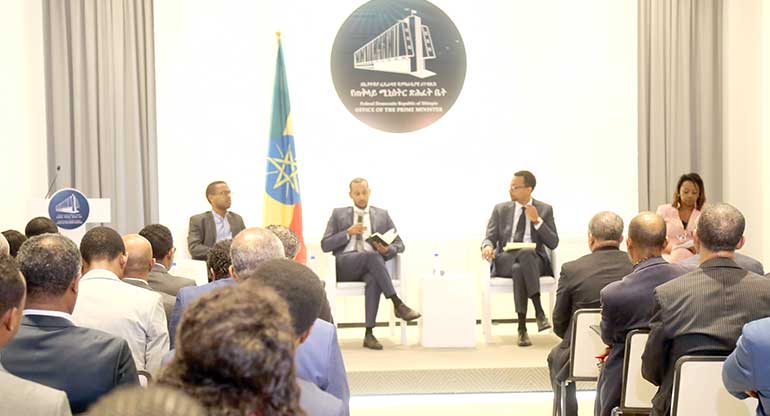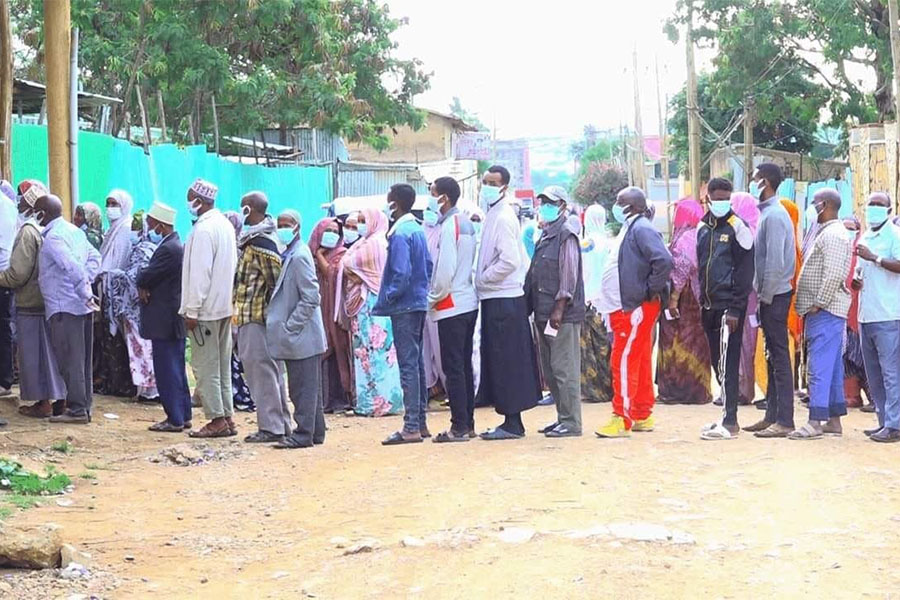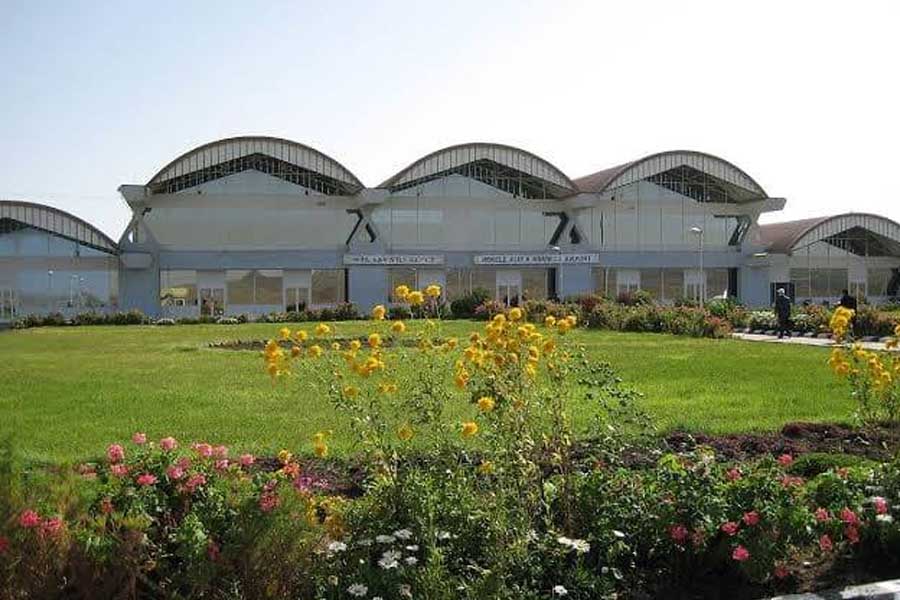
Sunday with Eden | Oct 16,2020
A 50-year old mother, Aster Amsalu, and her son, 26, began their search for an electoral office early in the morning on May 3, 2020. They could not have registered during the earlier days when officials at the National Election Board of Ethiopia (NEBE) set registration dates. Their schedule did not match the opening hours.
Neither did the mother bother to trouble her son on Sundays as those are his only days off work. Their search could not have been more cumbersome as they had to go to four separate offices before finally finding one open to register them.
Their first destination was a station around the Ayat roundabout, located in an inconvenient and secluded area they had to traverse through a muddy field to get to. Their search was futile, as they found the stations abandoned. In their next attempt in the same neighbourhood, near the neighbourhood of mostly gated communities of Ayat Real Estate in northern Addis Abeba, they were told the electoral office had been closed after registering 1,500 people. The security guard stationed there directed them to another office elsewhere. Tenacious, they went for another in a neighbourhood referred to as Meri, where the first office they found directed them to a youth centre.
Determined to get a hold of their voter cards that day, they headed to the office recommended. There, they found two young electoral officials sitting with large ledgers. They were registered after waiting in line behind a handful of other people.
This has been a recurring story in the capital where voters' reluctance to register initially shocked electoral officials. Only one-fifth of the expected voters in Addis Abeba came forth for registration, a trend consistent with low turnout across the country before the voters' registration timetable was extended at the end of last month. Unlike past elections, the 50,000 or so electoral offices were assigned to register only 1,500 voters each, with electoral officials claiming this a matter of precautions to avoid overcrowding during polling dates in compliance with COVID-19 prevention protocols.
Voters' registration for the sixth national elections has been in a pickle, with the electoral officials announcing that registration has been slow and far below the mark they were prepared for. Almost half of the total 49,407 offices across the country were not opened by April 15, 2021, over halfway to the registration deadline. A lack of support from regional administrations, instability in parts of the country, and disputes between regions were the reasons behind the Board's decision to extend the registration timetable to May 7.
It has since been postponed by an additional week in Addis Abeba and Dire Dawa and six of the 10 regional states.
One glaring exception is the Tigray Regional State, where fighting between the federal government and forces loyal to the defunct Tigray Regional State has engulfed the northernmost parts of the country since November last year. The ruling party in the regional state for almost three decades, parliament designated the TPLF last week as a terrorist organisation.
But conflicts are abounding in other places, too. An insurgency is in full swing in western Wellega of Oromia Regional State, while militias under the Afar and Somali regional states were in an open military conflict over claims of eight electoral offices. It took the intervention of the federal authorities, including two subsequent meetings chaired by the Prime Minister with heads of regional states, for the situation to improve.
In a couple of weeks, electoral offices open for business reached just over 43,000. An additional 4,000 stations will be operationalised in areas with reports of instability, officials at the Board told Fortune.
This, electoral officials attribute, led to a dramatic rise to 31.7 million people registered to vote nationally and 1.2 million in Addis Abeba. The largest numbers, 14.3 million come from the Oromia region, followed by the Amhara region, where 5.2 million voters were registered until our press time on Saturday, May 8.
Efforts exerted to improve the dissemination of information through text message and the fierce engagement by mass media and civil society organisations to aware voters have contributed to the increase, according to Board officials.
At an electoral office located in Qirqos District, referred by electoral officials as District 41, much of the registration was conducted before the extension of the deadline. The office registered up to 17 people a day then but now serves just two people. Considering the size of the neighbourhood, this office was anticipated to register about 500 people. As of last week, however, it has registered 540 voters.
Voters might have registered early because the office opens early in the mornings and closes at 6:00 pm.
"This was an important factor as voters could come and register before and after work," says Kalkidan Hailemichael (MD), one of the three facilitators at the office.
Mesud Gebeyehu, executive director of the Consortium of Ethiopian Human Rights Organisations, believes the number of registered voters increased in a short period of time due to voter-education campaigns organisations like his have carried out lately.
Election awareness campaigns by civil society organisations and associations have been underway. The posters pictured above are urging people to register to vote.
"We've been educating people for over a month, approaching them in-person as well as through the mass media," said Mesud.
One of the roles of the Consortium and other civil society organisations is to observe voters' registration. Mesud recognised irregularities the organisation has observed, such as offices that have run out of cards and the unavailability of facilitators. These are admittedly capacity gaps as the Board can only source its labour from the same workforce as any other entity, according to Soliana Shimelis, the communications advisor at the Board.
It's bound to have issues of competence, according to her.
These irregularities, however, have not deterred the mother of two, Aster, from registering last week. She does not want to miss the occasion to cast her vote this time around, her first since the third national elections in 2005. By far, it was the most contested elections ever where the opposition pulled the rug from under the incumbent EPRDF in Addis Abeba and among voters in urban centres.
"I feel like I have better options to choose from now," Aster said.
Her absence from the polls in the last two national elections was contrary to the increasing number of voters in every election since. Six years ago, when the EPRDF and its allies claimed full control of the legislative houses, more than 36.8 million voters were registered, of which close to 34 million showed up to vote, showing 15pc growth from the prior elections. It was a modest amount considering the 2.6pc annual population growth rate.
However, the number of political parties contesting the elections dropped from 58 to 44, where the EPRDF and its allies won all but 22 of the 1,965 seats in the nine regional councils. Around 6,000 candidates were fielded by the parties, in contrast to the 9,584 candidates in the race for the upcoming elections.
Willingness to vote has also become stronger during the current elections, according to an opinion poll conducted by EthioPoll Consult Plc, a private research firm, with a sample size of 853 participants from across the country (barring Tigray Regional State). Close to 89pc of those polled were found to be interested in voting in the sixth national elections.
"Even though people are willing to vote, there are a lot of factors playing against registering or voting," said Tsegaye Yilma (PhD), founder and researcher at EthioPoll.
Befekadu Hailu, a former Zone 9 political blogger and activist, attributes the low registration figures this time around to several reasons, from coerced voters pushing numbers up in previous elections to voters` apathy.
"Ruling party cadres usually pressure citizens to go out, register and vote," he said. "The significant mass usually doesn't go out to vote unless there is a lively contest and promising change; I don't think either is there now."
Topmost in the minds of many, from voters to candidates and from electoral officials to pundits, is the deteriorating security situation as a possible factor in discouraging registration. These are concerns echoed by leaders of political parties such as Mamushet Amare, president of the All Ethiopian Unity Party (AEUP), a formidable force in the alliance of the Coalition for Unity & Democracy (CUD) back in 2005. The CUD won all but one of the Addis Abeba City Council seats and the 23 seats the capital has in the federal parliament. It was an electoral gain that never materialised.
Mamushet remains sceptical towards the dramatic increase in the number of voters these past weeks, despite his party fielding 453 candidates. However, he believes extending the registration deadline was the right decision, adding that it might even be necessary to extend it further. He blames insufficient mass media engagement in creating electoral awareness about voters' registration.
After mid-April, campaigns were rolled out, including daily bulk SMS texts to 35 million people and communications through the mass media.
The series of televised debates among political party candidates, close to 50 up until last week, might have initiated many to register, observed Mesay Girma, deputy head of communications at the Ethiopian Citizens for Social Justice (EZEMA) party.
"We've seen positive attitude during campaigns," he told Fortune.
There are voters determined not to vote despite the media campaign, floods of mass texts or televised debates many find dull and ill-informed. This includes a 29-year old man currently residing in Bale, Oromia Regional State. He had voted in the past two national elections as he felt there were parties to choose from. For the upcoming elections, neither he nor his peers and neighbours have been registered.
"Even those who have taken their cards are considered the errant ones," he told Fortune.
Along with the lack of voter enthusiasm exhibited in the early registration period, campaigns by political parties have been frail and dominated by the ruling party and just a few contenders. The Prosperity Party (PP) and EZEMA have been the only parties utilising the columns designated for campaigns in the state Amharic daily Addis Zemen. In contrast, opposition parties such as Hibr and Enat have failed to fill their dedicated space. In the seven days of last week, out of the 24 columns printed, 37pc were not used, revealing how blasé the electoral race has made voters.
It is no different in the electronic media space. Only 55pc of the allotted air time has been used, according to data compiled two weeks ago by national electoral officials.
Mamushet of AEUP attributes the cool off time in electoral campaigns to the spat of instability in the country.
"The party denounces killings of civilians," said Mamushet. "We've stopped campaigning for a while to show that we've been hurt."
For Hibr Ethiopia Democratic Party, campaigning has been a challenge. Otherwise known as Hibr and having the majority of its candidates in the Southern Regional State and Addis Abeba, it has had to deal with a lot of resistance and misconduct, according to its President, Girma Bekele. He blames the integrity of the national electoral board, calling it "questionable" as one moves in the hierarchy down from the board members based in the capital.
"It gets worse," says Girma. "Even worse than before. We don't see any practical changes. It has become clear that there is a capacity issue."
Running elections is a tough task to take on, Soliana of the Election Board concedes.
"No other project in the country is as nationwide as elections," she told Fortune.
But the lack of knowledge by political parties in the structural makeup of the Board is to blame, according to Soliana. She observed political parties lodge their complaints not particularly directed towards a specific structure or operational activity.
Girma alleges that some of Hibr's candidates have been harassed, and it took a lot of convincing to have the candidates continue to run. The party also claims their campaign banners have been torn down in some towns, such as in Wolayita. Hibr also calls foul on campaigning strategies, having witnessed that the ruling party has been campaigning in labelled off-limits under election laws, such as inside colleges compound, religious premises and markets, contrary to what electoral laws dictate.
Elements from the ruling party contribute to the unfairness of the process, Befekadu, the blogger, amplified Girma`s claims.
"The Board may need to suspend the process and restart in places where there are obvious irregularities," says Befekadu.
These are allegations rejected by the Prosperity Party (PP), whose leaders claim they have not heard of any accusations but conceded that it might have happened.
"Since we're living in a country where democracy is in its infancy, these kinds of situations are expected," said Bikila Hurissa (PhD), public and international communications head of the PP.
The NEBE has received multiple grievances about the misconduct of electoral campaigns from several parties, including the ruling party, according to Chairperson Birtuka Mideksa. But the accusations lack crucial details on the alleged misconduct. Having to go with insufficient material evidence has made it difficult for the Board to address the issues right away.
"We've gathered grievances, and we're looking into how to address them," the Chairwoman said, conceding that there might be implementation gaps where such issues are concerned.
Befekadu believes major opposition parties withdrawing from the process led their supporters to proactively keep people from registering. The Oromo Federalist Congress (OFC), under the chairmanship of Merera Gudina (Prof.) and the Oromo Liberation Front (OLF), run by Dawud Ibsa, have boycotted, citing the arrests of their leaders and supporters, as well as closer of their offices ahead of the polls. Prominent among them include Jawar Mohammed and Bekele Gerba of OFC, and Iskinder Nega of Balderas for Democracy, although the latter runs in the elections.
Amidst campaigns and just a few weeks away from the polls, nonetheless, it is these concerns international observers cite as the next elections failing to meet minimum standards. Over 200 international election observers had been registered by February 2021.
The European Union (EU), which has dispensed 20 million euro to the national electoral board, announced its decision not to send observers.
"It`s disappointing that the EU has not received the assurances necessary to extend to the Ethiopian people one of its most visible signs of support for their quest for democracy," reads a statement from Josep Borrell, a senior official from the European Union.
It is a decision that annoyed Ethiopian authorities.
"While external observers could add some value to strengthen the quality of the electoral process, they are neither essential nor necessary to certify the credibility of an election," retorted a statement from the Ministry of Foreign Affairs.
However, later in the week, the Ministry announced that the government is willing to discuss the outstanding issues further, expressing its hopes that the EU will reconsider its decision. The outstanding issues include permits to use communications devices by the team of observers deployed.
Between a determined incumbent, sceptical opposition, polarised voters, and an overwhelmed electoral board - if not the indifferent international community - the Ethiopian electorate is heading to the polls on June 5 in much of the country, and Addis Abeba and Dire Dawa cities a week later. The post-elections period presents no appeal to voters such as the 29-year old man from Bale. It shows the country is between electoral anxiety and precarity.
Girma of Hibr is one of the few oppositions that believe Ethiopia is not ready for elections. He thinks "there isn't enough ground to conduct the elections in a month," pointing out gaps in voters' registration and a series of limitation to campaigns. His urging to hold it until broader consensus is reached has little appeal to others, including Befekadu, who cites that previous postponements ended in crisis.
Chairperson Birtukan, however, stated in a press conference that the polling date might indeed face an extension if the NEBE sees it fit to recommend one to parliament after conducting an assessment in the coming days.
According to her, the Board will need to put together all variables before making a decision. Preparation for polling activities will begin upon completion of registration and the NEBE will have to account for activities such as the distribution of polling equipment, rolling-out of training, and recruitment of poll facilitators.
"We'll be working to fit in these activities in between the completion of registration and polling dates," said Birtukan.
PUBLISHED ON
May 08,2021 [ VOL
22 , NO
1097]

Sunday with Eden | Oct 16,2020

Sunday with Eden | Oct 22,2022

Editorial | Dec 07,2024


Radar | Sep 19,2020

Fortune News | May 08,2021

Fortune News | Sep 30,2021

Featured | Sep 06,2020

Editorial | Jun 25,2022

Editorial | Sep 30,2023

Dec 22 , 2024 . By TIZITA SHEWAFERAW
Charged with transforming colossal state-owned enterprises into modern and competitiv...

Aug 18 , 2024 . By AKSAH ITALO
Although predictable Yonas Zerihun's job in the ride-hailing service is not immune to...

Jul 28 , 2024 . By TIZITA SHEWAFERAW
Unhabitual, perhaps too many, Samuel Gebreyohannes, 38, used to occasionally enjoy a couple of beers at breakfast. However, he recently swit...

Jul 13 , 2024 . By AKSAH ITALO
Investors who rely on tractors, trucks, and field vehicles for commuting, transporting commodities, and f...

Oct 4 , 2025
Eyob Tekalegn (PhD) had been in the Governor's chair for only weeks when, on Septembe...

Sep 27 , 2025
Four years into an experiment with “shock therapy” in education, the national moo...

Sep 20 , 2025
Getachew Reda's return to the national stage was always going to stir attention. Once...

Sep 13 , 2025
At its launch in Nairobi two years ago, the Africa Climate Summit was billed as the f...